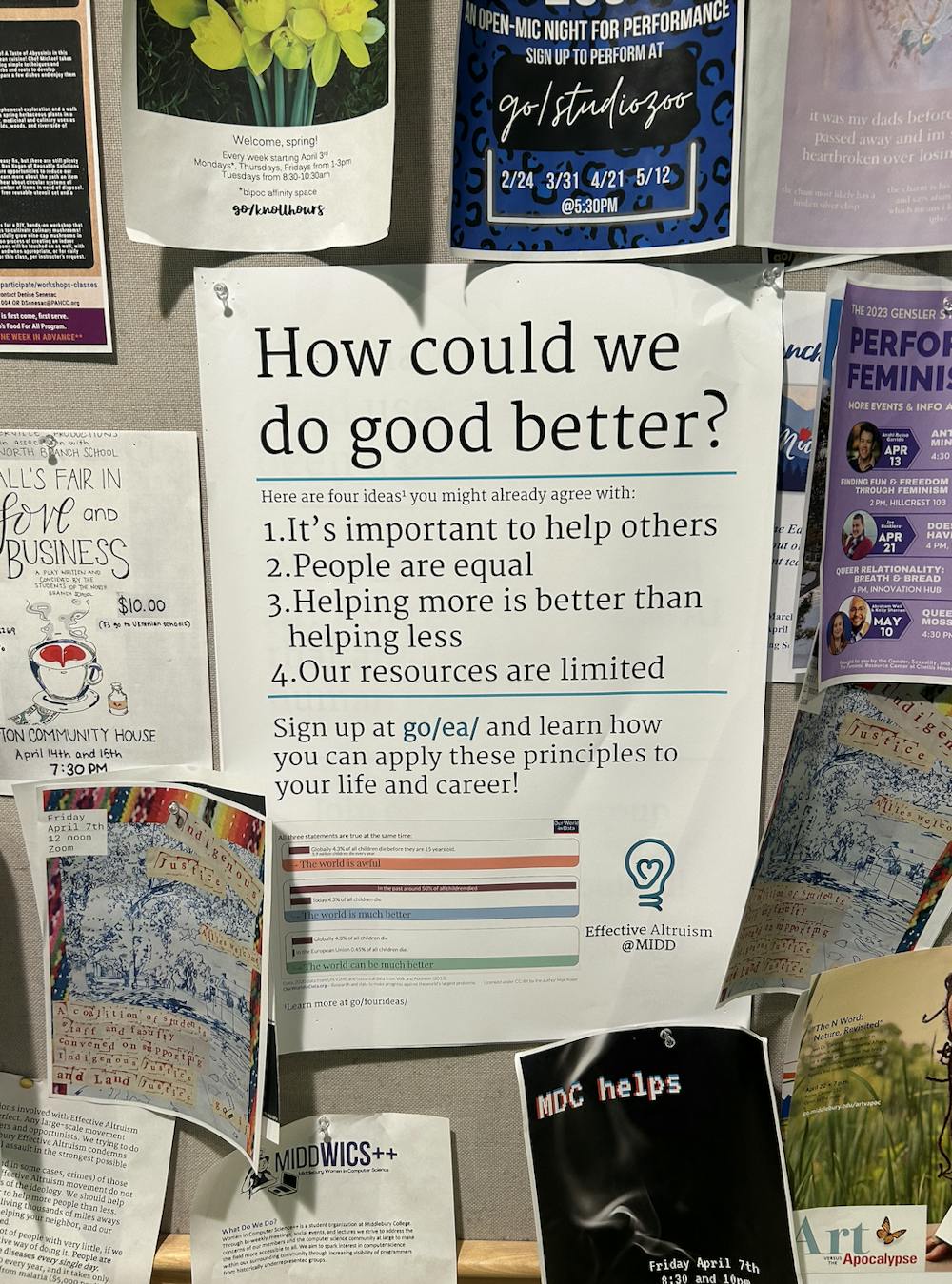Every week, members of the Effective Altruism (EA) club meet to discuss the ways they can make meaningful changes with limited resources. The club was founded by Camiel Shroeder ’25 in the fall of 2022 and is currently run by President Tim Hua ’23.
“Effective altruism is when you want to do good and help the most people possible, and you think about how to go about doing that,” Hua said.
Hua referenced the article Four Ideas You Already Agree With (That Mean You're Probably on Board with Effective Altruism) by Sam Deere during the club’s past meeting when further explaining what the EA movement is. According to Deere, these four ideas are:
1. It’s important to help others
2. People are equal
3. Helping more is better than helping less
4. Our resources are limited
Essentially, Deere illustrates that the EA movement helps the most people with such a limited amount of resources available. EA strategizes the most effective ways to uphold the four values that Deere describes.
“This way of thinking is applicable to any way that we might want to do good — whether that be agitating for political change, choosing where we donate our money, or how to have a big impact with our careers,” Deere wrote in the article.
During the past meeting, members read and discussed the implementation of safety fundamentals when developing Artificial Intelligence (AI) software. Implementing safety fundamentals — such as researching ways that AI could potentially be harmful and strategizing policies that prevent these risks — is an effective way to ensure that AI systems aren’t being used in harmful ways.
Tiffany Li ’26 was introduced to EA in high school when they began listening to a podcast called 80,000 Hours — the estimated number of hours one works during their career. The podcast emphasizes the importance of long term actions to improve the state of the world and how this should be a moral priority.
“I came to Middlebury and wanted to find an EA club, and there was one, so I joined,” Li said.
Member Willie Thacker ’23 was introduced to EA when he became friends with Hua. Hua became an avid EA follower mainly after reading about the practice online. He attended several EA conferences where he was able to speak with fellow effective altruists and learn more about EA.
“Thinking about EA topics and talking to other people about these topics help me figure out what I want to do in life,” Hua said.
The club had a retreat last semester where they stayed in a hotel in Burlington, Vt. During the retreat, members held presentations about career planning. Hua has also attended conferences held by EA Global — an organization that holds events where members of the EA community collaborate to start initiatives that support the EA fundamentals — specifically ones centered around nuclear policy. Li and Hua applied to attend an EA Global conference in London during finals week.
“You want to help people, and helping more people is better than helping less people,” Hua said. “Helping people who are far away is equally as important as helping people who are nearby and resources are limited so you have to act.”
Professor Alison Stanger in the Political Science department teaches about EA in her senior seminar course: Who Elected Big Tech? Stanger believes it’s difficult to quantify meaningful things in life, and therefore is not an effective altruist herself. However, Stanger does believe that effective altruists’ perspective and reason-based approach are valuable in conversations centered around ethical thinking.
“Ethical altruists are perhaps unique on college campuses today for openly asking other students to prove them wrong,” Stanger said. “We need more of that kind of moral debate on campus.”
Members are dedicated to having difficult conversations and examining prevalent issues from a variety of perspectives that help the most people and effectively employ the limited resources. Hua encourages anyone interested in learning about EA or attending the club to contact him directly.
Ellie Trinkle '26 (she/her) is the Senior Arts and Culture Editor.
She previously served as a News Editor and Staff Writer. She is a Film & Creative writing double major from Brooklyn who loves all things art. You can typically find her obsessively making Spotify playlists, wearing heaps of jewelry, or running frantically around campus.




